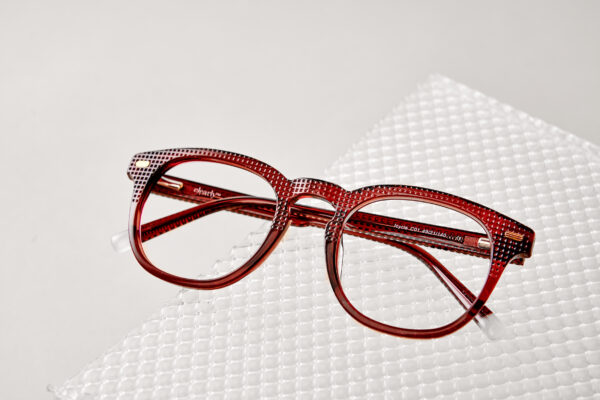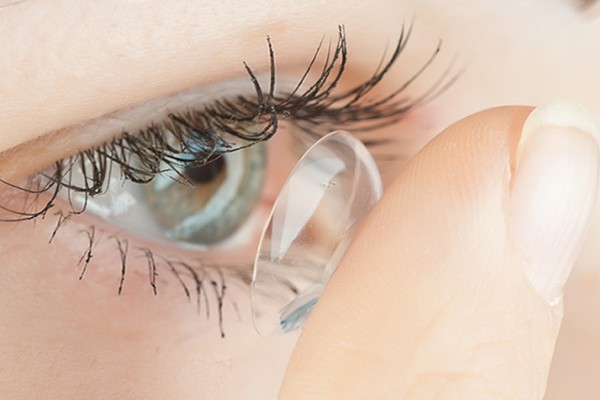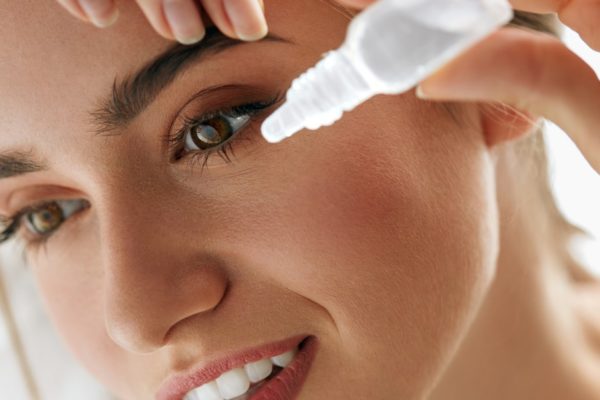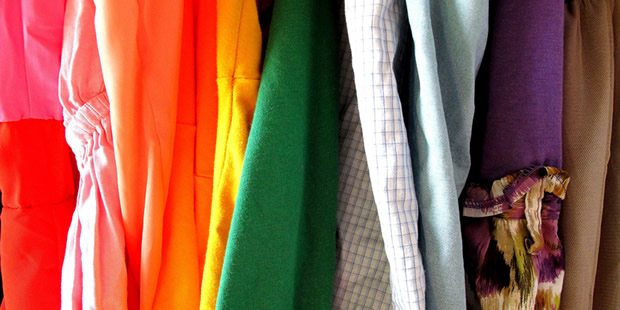Swimming with contacts – is it a good idea? The short answer is no. Almost everyone who’s worn contact lenses while swimming before knows how messy things can get, and swimming with glasses can be tricky: they’ll get wet, blurry, and possibly lost.
If you have less-than-perfect vision, we can sincerely sympathize with you on the challenges that blurry vision has on swimming or spending time in the the water.
In this blog, let’s find out the risks of swimming with your contacts in and why it’s not worth taking those risks in swimming pools, lakes, and marine beaches.
- Can you swim with contact lenses in?
- What are the signs of an eye infection?
- Can you wear contact lenses in a pool?
- Can you wear contact lenses with goggles?
- Can you buy waterproof contact lenses for swimming?
- Look after your eyes while wearing contact lenses
Can you swim with contact lenses in?

Swimming with your contact lenses in or getting them wet (apart from getting them wet using contact lens solutions or rewetting eye drops) is a bad idea. Soft contacts absorb water very quickly and most waters – from sea to tap water – contain bacteria and chemicals that can cause eye irritation and infections if you leave your lenses in for a long time.
Plus, water can cause soft lenses to change shape and tighten on your eyes, which can make them difficult to wear and remove. You should avoid getting water in your contacts from:
- Swimming pools and hot tubs
- The shower
- Lakes and rivers
- The sea
What are the risks of swimming with contacts in?

If you’ve been swimming with contact lenses in, you may risk developing several sight-threatening conditions:
- Eye infections (like corneal ulcers and Acanthamoeba keratitis) can lead to permanent vision loss
- Eye inflammation from the lens sticking to your eye can cause corneal abrasions or scratches
- Dry eye syndrome from getting freshwater, saltwater, or chlorinated water in your eyes can worsen existing eye conditions
Water from the sea, lakes, and rivers can be more dangerous than pool water because freshwater and saltwater can be contaminated with bacteria and pollutants that aren’t killed off by pool chemicals.
One of the most vicious water-borne bacteria called Acanthamoeba can provoke a rare but severe eye infection (known as Acanthamoeba keratitis) that may inflame your cornea and cause blindness if left untreated.
If you experience eye irritation after you accidentally swam or showered with your contacts in, book an appointment with an eye doctor as soon as possible – find one at a Clearly store near you.
What are the signs of an eye infection?

Keep a look out forstubborn symptoms that could be a sign of an eye infection:
- Itchy, watery, red, painful, or swollen eyes
- Eye discharge
- Blurry vision
- Sensitivity to light
- The feeling that something is in your eye
If water gets in your contacts when swimming:
- Gently take them out
- Throw them away immediately to reduce the risks of eye discomfort and infection
- Flush your eyes with artificial tears or lubricating drops
It’s best to stay contact lens free for the rest of the day and wear your glasses, so your eyes can breathe and heal. Remember: if any of these symptoms persist or worsen, we recommend seeing an eye doctor promptly – book an appointment at a Clearly store near you.
Can you wear contact lenses in a pool?
No, wearing contact lenses in a swimming pool will put your eye health at risk. Even though chlorine kills bacteria, it doesn’t kill it all.
Pool water can easily get into your eyes and contacts when swimming, and having bacteria and chlorine attached to your contacts can make your eyes more vulnerable to irritation and infection if you don’t remove them immediately.
Can you wear contact lenses with goggles?

You may find sources online in which some people think wearing goggles with soft daily disposable lenses can be a hack for wearing contacts underwater. But the water protective level of goggles can be hit or miss, and there’s no guarantee that water won’t seep in. It’s best to wear swimming goggles made with your prescription if you spend a great deal of time in the water.
If you forget to remove your contacts while swimming, keep your eyes closed when your goggles are flooded to prevent water from getting into your eyes and remove your contacts right away. If your lenses stick to your eyes, use rewetting drops, and then throw your contacts away.
Can you buy waterproof contact lenses for swimming?
You can’t get waterproof contact lenses because contacts need to be breathable and permeable for your eye’s cornea to get enough oxygen. Waterproof contacts would restrict oxygen flow-through to your eyes: your eyes could suffocate and swell, which makes it difficult to see and raises the risk of long-term damage on your vision.
Look after your eyes while wearing contact lenses
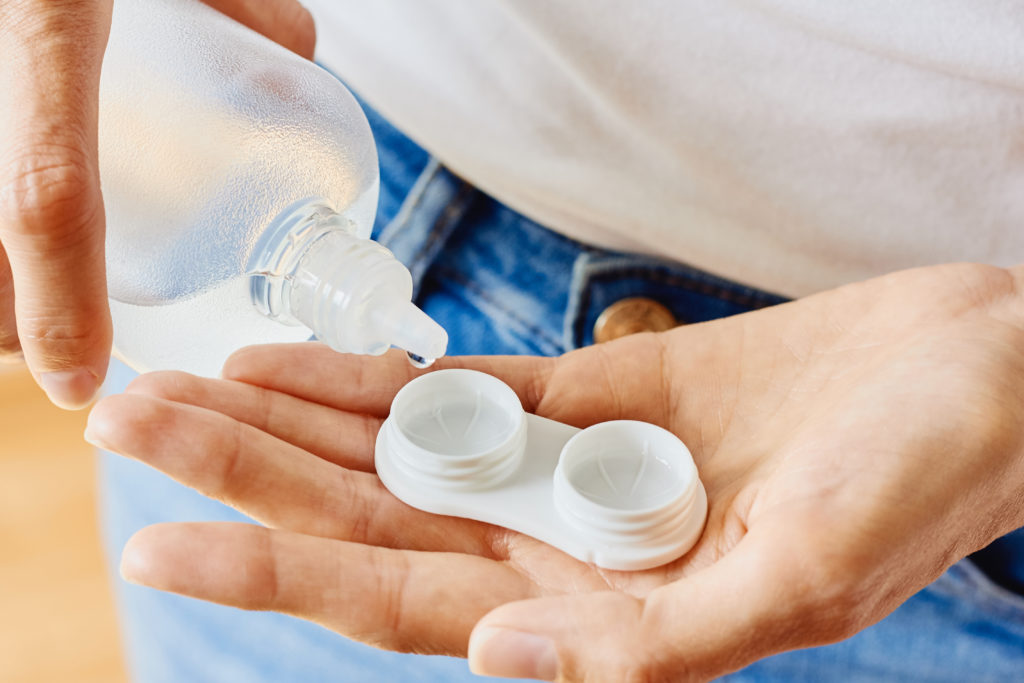
As well as being mindful of the risks of swimming with your contacts, follow our quick tips to take care of your eyes with proper lens hygiene:
- Get your eyes checked every 1-2 years to help ensure your eye health and guarantee you have the most up-to-date contact lens prescription
- Wash and dry your hands every time before putting in or taking out your contacts to minimize the risk of eye infections
- Properly clean and disinfect your contacts with multipurpose solution or peroxide solution following the manufacturer’s instructions
- Avoid using water, saline water, or spit (you’d be surprised…) to clean lenses
- Use fresh lens solution to store contacts and discard after using every time
- Use a new contact lens case every three months to prevent bacterial or fungal contamination
- Avoid overwearing your contacts and make sure to follow its wear time
- Avoid sleeping in your contacts unless specified
- Remove your contacts before a swim or water exposure of any kind (swimming pool, hot tub, lake, and sea water)
P.s.: When in doubt, let’s look at Canadian Olympic hero Maggie Mac Neil as a great example and avoid wearing contacts when swimming.
A golden reaction for a golden moment
Maggie Mac Neil 🇨🇦 wins Canada’s first gold medal of #Tokyo2020 in the 100m butterfly
Watch live: https://t.co/WrexsnEcRw pic.twitter.com/NvVJPwOBPA
— CBC Olympics (@CBCOlympics) July 26, 2021
Maggie Mac Neil not knowing what’s going on without her glasses will probably be the only time I ever relate to an Olympic athlete #Tokyo2020
— Raisa Patel (@R_SPatel) July 26, 2021
If you think you may have an eye infection, it’s best to see an eye doctor at a Clearly store near you. If you have workplace benefits, such as vision insurance, using your benefits can help cover for vision care expenses.
Read more:







